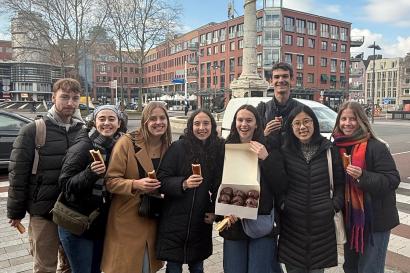It’s beyond me how my semester in Barcelona is already halfway done. It’s been a time of adjustment and transition. A time of taking it all in, embracing the new. It’s an adventure – “A time of your life,” they say. But low and behold, there indeed is the word “study” in study abroad. Yes, that’s right. This is an academic program, where I am taking courses with the intent of transferring credits to my home school in the hopes of graduating in the Spring.
I must admit, I came to study abroad anticipating academics to be a breeze. “Professors would take it easy on students. They know we’re here to travel, have fun, enjoy life, do everything except study,” or so I thought. Maybe it’s the fact that I’ve spent the past year and a half taking classes on Zoom or taking less credits to manage my workload during the pandemic but taking five courses (16 total credits) this semester needed some getting used to. Other than the fact that I’m used to taking four courses for 16 credits back at my home university, I would say the coursework here at IES is pretty much equivalent.
Although it varies from professor to professor, the general breakdown of grades for each of my courses consists of participation, homework, project or research paper, midterm exam, and final exam, each worth 20% of the final grade. I think the most different learning style here in contrast to my home university is the emphasis on class participation. A participation grade that contributes 20% to the final grade seems like a lot compared to the 5-10% I’m used to. Initially, I was also intimidated by this because I tend to be timid at the beginning until I get comfortable in my classes. Well, good thing class participation doesn’t only consist of raising your hand to answer questions in front of the whole class but small group discussions and active engagement during lectures and in-class activities. It’s been a good initiative for me to come to class prepared and ready to interact with the materials being covered in each class.
The nice thing about study abroad, too, is that you have more flexibility in course topics that you choose to take. Even though I am a double major in Political Science and Global Studies, I am not limited to courses pertaining to my majors. I only have one course here that is fulfilling a major requirement for my degree, a history course titled The American Century: US Policy in Western Europe. In addition to the mandatory Spanish course, I get to take more cultural classes like Food as an Expression of Culture and Cross Cultural Psychology. I am also taking a class covering a topic of personal interest, which is Crime, Disorder, Policing and Justice: Spanish and European Perspectives. I have other friends who are also Political Science majors that are taking very different classes like Storytelling or Fashion Design! I would encourage other students who are planning on studying abroad to save their general education requirements to fulfill during their time abroad. Take a break from your major requirements and enjoy learning about cultures or other topics that fascinate you!
I won’t sugarcoat it – no matter how interesting the courses can be, trying to balance academics and social life while abroad is difficult. I’ve been trying not to get too engrossed in studying to sightsee and travel. What I’ve learned so far is that it’s okay to be overwhelmed, but it’s also important to know your own limits. Professors here still expect quality work as any other professor would, but they are empathetic and are very open chat and discuss any concerns you may have. They are here to help you and not distress you (despite the workload trying to convince you otherwise).

Sanny Yang
<p>Hi, my name is Sanny Yang. I am a senior at Hope College (Holland, MI) studying Political Science and Global Studies. I was born in South Korea but mostly grew up in Lilongwe, Malawi. I am excited to study abroad in Barcelona, Spain and to share this journey with you!</p>








